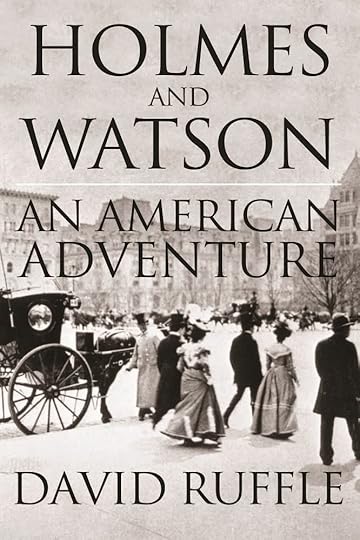David Ruffle's Blog, page 5
December 11, 2015
An Interview with Dan Andriacco
Andriacco's Sebastian McCabe - Jeff Cody mystery series, set in a small town in Ohio, is very much in the tradition of his Golden Age favorites.
Andriacco, known to friends as "Doctor Dan," holds a Doctor of Ministry degree from Columbia Theological Seminary in Georgia. He was born in 1952 in Cincinnati, Ohio, where he lives with his wife, Ann. They have three adult children and five grandchildren.

How did your first book come about? Why, what and when?My first published book in the Sherlockian field was Baker Street Beat. At some point I realized that I had written a lot about Holmes over the years. I assembled them into a book of essays, radio plays, and short stories just to have them all in one place. I planned to self-publish but I couldn't figure out how to do it. Then Joel Senter of Classic Specialties told me about MX Publishing. Amazingly, the book was in print just a few months after I sent Steve Emecz the manuscript. That was in 2011. I've had two books a year published ever since.
Thanks! I think I started with wanting to have a "Watson" that had a built-in conflict with the amateur sleuth protagonist for the sake of dramatic tension and also for comedy. So I came up with the idea of a small Catholic college public relations director hose best friend and brother-in-law was a professor who created PR problems for the college. It didn't work out exactly that way because there isn't really that much tension between Jeff and Mac, but that's how I originally saw them.
Your McCabe-Cody series of mysteries go from strength to strength. Did the idea come to you fully-formed?
To some degree, the Holmesian element is automatic. It's just so much a part of me that it comes out in all my mystery writing. But my publisher specializes in Sherlock Holmes so some of it is put in with malice aforethought. The second book in McCabe-Cody series, Holmes Sweet Holmes, originally had a different title and the Holmes element wasn't nearly as strong. I wrote the first version many years before it was rewritten and published.
And was it a conscious decision to have the Holmesian themes?
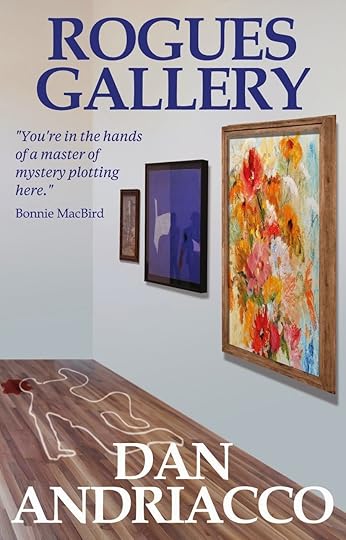
How do you see the series and characters progressing?
There have been some changes and there will continue to be. I'm not sure that Lynda's job at the media company is secure. Tere's a major change in another character's job at the end of the next book in the series. And at some point a continuing character will turn out to be the murderer. I don't want the series to stagnate, so there has to be some changes - but not enough to ruin the sense of familiarity. Readers tell me that when they open one of my books it's like revisiting old friends. I don't want to ruin that!
It's over! Kieran and I decided to make it a trilogy. I think I had the basic plotlines of the second and third books finished before the first was published. The third ends with a shocking surprise. I think that was a good conclusion to the series. The last line of the book may read like we're setting it up for another book, but that wasn't the idea.
The Enoch Hale series in collaboation with Kieran Mc Mullen is a recent innovation. Is that series set to run and run?
No! I will leave that to others. It's hard to make a Holmes novel seem like the Canon. To be authentic - at least to me - a Holmes novel has to be relatively short (45,000-60,000 words), have Holmes missing for about half the book, and be an adventure story as much as a mystery. Even The Hound of the Baskervilles follows that pattern - Holmes is gone for much of the book, and the killer is revealed way before the end. And of course the first and last ACD Holmes novels are divided into two parts, with the second part set in America in the past and Holmes is nowhere in sight.
Any plans to write a full length Sherlock Holmes pastiche?
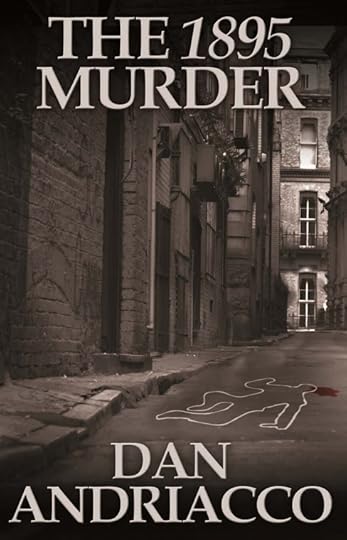
Yes! My wife is one of my four beta readers. Our grandchildren are great readers, so I look forward to them meeting Sebastian McCabe and Jeff Cody some day.
Are your family very supportive?
What constitutes a normal day for you?
That depends a bit on what stage I'm in with a project, but basically I work on writing or editing or plotting for an hour every morning after I work out at the gym. Then I do my day job as director of communications at the Archdiocese of Cincinnati, which involves a lot of writing. I also write or edit my own projects at home after work, but how long I do that depends on how much energy I have and what needs to be done that day. I'm pretty focused, which is how I wrote two books a year four years. That pace may not continue.
It impacts every area of it - at least, I hope it does!
How does your faith work in your life?
At the moment I'm reworking a comic detective novel set in 1991, which is when I originally wrote it. Re-reading it makes me laugh out loud. It's so "high-concept" that I don't want to say anything more about it right now. My wife and I also plan to write a mystery series about an early twentieth century vaudeville clairvoyant - her grandfather. The first book is largely plotted. Neither of these efforts is Sherlockian and so probably will not be published by MX. But friends of Jeff Cody will be happy to know that I expect his adventures to continue, at least one a year, for a long time to come.
And the future? What can we expect from you?
Visit Dan's website: HERE
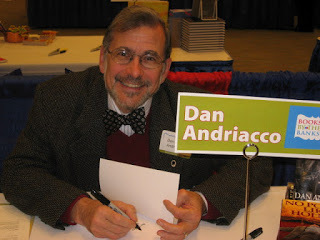
December 2, 2015
Sherlock Holmes and the Missing Snowman
Christmas is coming.....
What to buy for those young, budding Holmesians?
May I suggest.......
Sherlock Holmes and the Missing Snowman!
This is what one reviewer said:
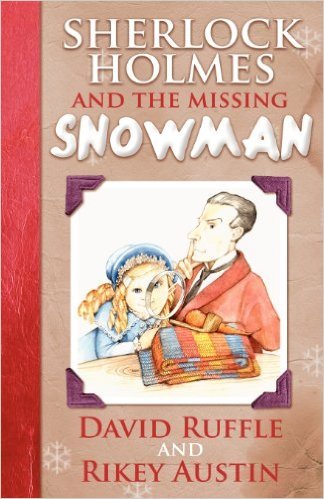
This richly-illustrated children's book is a delightful story of a little girl who had lost her snowman. Naturally, she and her mother visit the famous detective Mr Sherlock Holmes at his lodgings at 221b Baker Street.
Much to Dr Watson's astonishment, the World's foremost consulting detective takes the case and pursues it with his legendary sagacity and tenacity. He discovers - but no, I will not spoil the ending.
The writing is simple enough for a small child to follow, but, as one would expect from veteran Holmes pastiche author David Ruffle, it feels right.
The many detailed illustrations, by Rikey Austin, are superb. We see Holmes sitting by the fire in his slippers reading The Times, while Dr Watson looks out on a snowy Baker Street; Mrs Hudson shows little Henrietta, their five-year-old client in; Holmes examines the scene of the crime through his magnifying glass, and so on. The characters, especially Holmes and Watson, are very well portrayed.
Adults too will appreciate the lovingly-crafted illustrations.
And another:
Move over adult Sherlock Holmes fans, the younger set now get their own version of our favourite intrepid detective, Sherlock Holmes. Written in a gentle yet classical Holmes style, Holmes does what he does best, solve a mystery for a young girl whose snowman has mysteriously vanished. Would definitely recommend this book for children of Sherlock Holmes fans as it's bound to be a classic. The manner in which Holmes solves the mystery should spark the imagination of a younger reader and lead to thoughtful discussion. Just how did Holmes solve the mystery? Discover it yourself in the pages of this well written book. Lovely illustrations much in keeping with the gentle style of the story round out the book nicely.
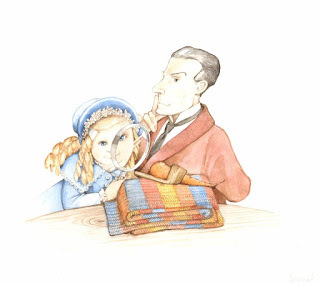
Buy it on Amazon UK HERE
Buy it on Amazon USA HERE
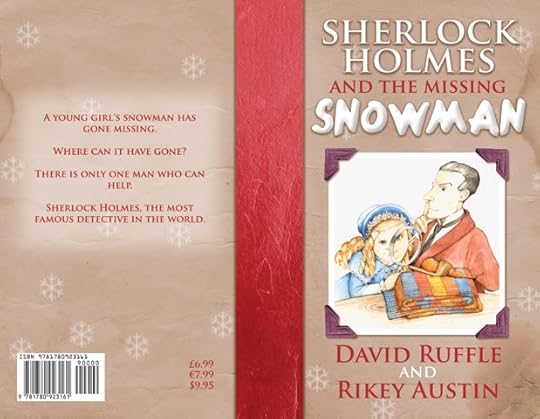
November 30, 2015
An Interview with Sherlock Holmes author, Hugh Ashton.
In addition to these, he has also published historical and alternate historical novels, short stories, and thrillers.Together with artist Andy Boerger, he has produced the Sherlock Ferret series of stories for children, featuring the world's cutest detective.
What prompted you to enter the world of Holmesian fiction?
This is all going to sound rather silly. I was invited round to a friend’s house for dinner, and after dinner we started playing Cluedo. Colonel Mustard in the library with the candlestick. Actually, it was the American edition, so there was no library (changed to a “den”) and no candlestick (changed to a “trophy”). But I digress. We started talking about detectives, and I mentioned that we all knew about Sherlock Holmes’ smarter older brother, Mycroft. But what about Sherlock’s smarter younger sister? We never know about her. So my reaction was to go away and write a story about her. And so the next day (I am pretty sure it was only one day) I sat down and wrote “The Odessa Business”, and put it up on Smashwords. It was liked by those who read it, and I thought, “That was fun”.So the next day or the day after, I sat down and worked out how Isadora Persano came to be found stark staring mad, with a matchbox on the table in front of him, containing a remarkable worm, said to be unknown to science. That was an enormous amount of fun to write and it went up on Smashwords, and got rave reviews from friends.

I had a contract with Inknbeans Press to publish my short stories about older Japanese people, Tales of Old Japanese, and Jo, my editor, looked at these two stories, and told me if I wrote a third one, Inknbeans would take them and put them out as a book. So the politician, the lighthouse, and the trained cormorant came to be. The whole thing went incredibly fast. My Cluedo game was on January 2, and we had the paperback of Tales from the Deed Box of John H. Watson MD(my choice of title) out on Amazon by the end of the month.Obviously, I’d always loved Holmes and ACD’s style, and had even written a couple of unpublished pastiches, as well as some advertising copy in that vein, but these were the first ones that I felt were good enough to show the world, and more importantly, that were entertaining, and not merely five-finger exercises in writing.
Were you a little apprehensive as to the reaction that your first Holmes book would receive?
To be honest, no, I wasn’t, other than the first-night nerves that any author feels when his work is viewed by the world. I had very little knowledge of the Sherlockian/Holmesian world outside the Canon. I knew of the Adrian Conan Doyle pastiches (I didn’t even know they were called “pastiches” in the jargon!) and had read them along with the Canon. I’d heard of House of Silk, but never read it.So I had nothing with which to compare these stories, really, other than the Canon. I suppose that if they had been slammed by the critics or the readers, I wouldn’t have continued. I’d have told myself that writing ACD pastiches was not for me, and I’d have moved to other things.
Several successful titles later, do you think you have mastered the art of pastiche writing?
Define “mastered”, please. I am writing adventures which capture a certain nineteenth-century mood and style. It’s not quite ACD, but it’s close enough to deceive at a first glance. There are elements of ACD in my writing, but sometimes his Holmes comes up with some sort of aphorism or bon mot that mine can only just begin to approach. I do try to slip in one or two of these every so often, but I think I fall short most of the time.
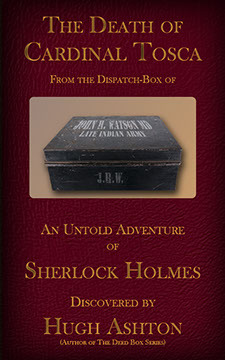
My Holmes and Watson are described in greater depth than ACD’s. I don’t think I move away from the original characters, but I do see and expose different sides to them. My writing provides more 20th/21st century depictions of character than the Canonical descriptions, though I do hope that the characters themselves are firmly planted in the late 19th century. But I don’t give Holmes a sex life or anything like that. That’s not Canon.One thing about pastiches – you must always give a reason why Watson didn’t publish the account of the story. Was there a political or social reason why the story remained in the tin box? Would it have embarrassed the Establishment? Was there a reason it might have embarrassed Holmes? Or even Watson? Or simply it was too slight a case to be considered (I’ve written two rather lightweight, and I think amusing, pastiches, which still manage to show off Holmes’ skills and his character)?
The reviews of your Holmes books are generally excellent, but does that mean you have a lot to live up to each time you begin a new mystery?
I mentioned character just now. Plot, of course, is the driver to each adventure. But the plots write themselves. What I mean by that is that I will usually start with the few canonical words that introduce an Untold, and take it from there.I try to choose the right sort of names where they’re not given in the Canon (though ACD had some very strange names for some of his characters – Hilton Cubitt, for example – who was ever called Hilton in those days? Or Sherlock, come to that?). And most of the time, I become Watson when I’m writing. By that, I mean, I listen to the client’s story, I am puzzled as Holmes works his detective magic, and I am suitably impressed as enlightenment dawns.Very often, when I start a story, I don’t even know exactly what the crime will be, let alone the identity of the villain. These things reveal themselves, sometimes at four in the morning, when I wake up and say to myself, “So that’s what happened, and why and how!”.The style is the easy part. I have moved away from all the adverbs that ACD used, but still use a lot of tags (“retorted”, “replied”, “cried”, and even “ejaculated”). There are the odd inversions, and tricks of speech that I try to incorporate.Above all, the devil is in the details. If Holmes and Watson take a train, it must start from the correct station, and that station must have existed at that time. Once I found myself stuffing three people into a hansom cab. I managed to change that before it hit my editor! A very tricky element is the social class structure of those days. How was a cook addressed? A parlour-maid? A scullery-maid? And were these modes of address different depending on the social class of the employer? This is something it’s almost impossible to research accurately, other than reading contemporary literature, which for the most part ignores servants, at least in a way that’s useful to my research.
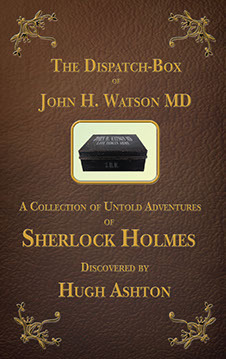
So that’s what I have to live up to.
Is it easy to balance the demands of work with your multi-faceted writing career?
My work is writing, and I’m self-employed. Not all my writing is fiction, though. I write advertising and advertorial copy for a large international business magazine. There isn’t a lot of work from there in terms of volume, but it is very intensive and detail-oriented work. It pays the rent. There are also a few other small gigs, but these don’t take up a lot of time, so I have time to write, and to work on promotion together with Inknbeans. So the answer is, yes, it’s easy. And I write fast. My personal best is an 8,000-word pastiche in a day. If a short (7-8,000 word) pastiche is taking me more than a week to complete, then that’s too slow. It probably will bore the reader, as well. So throw it away and start again.As you say, I don’t write just Holmesian material, but I consider myself a chameleon as a writer, capable of producing material in a number of different styles. I can actually write advertising copy interspersed with a pastiche, while attending to my busy Facebook feeds.Like ACD, I would like to be known as an author with strings other than Sherlock Holmes to his bow. That’s why I’ve written a couple of contemporary thrillers, Leo’s Luck and Balance of Powers, as well as a 19th century science fiction novel, The Untime. I would love my pastiche readers to try these. The Untimewould especially appeal to them, I think, written as if it had been translated from the French of Jules Verne (actually, some of the dialogue initially popped into my head in French, and I then translated it).
How do you write? In silence? At the same time of day?
First thing is that I write at home. I hate writing on a laptop, so the whole “Go to a coffee shop and ‘Look at me, I’m a writer’ thing” is out of the question for me. I find that pretentious, anyway. My working setup is a Mac mini with two 24” screens, a Happy Hacker mechanical “clatter-clatter” keyboard, and alternating between an ergonomic mouse, a trackpad, and a trackball. The software is Scrivener. I usually work either in silence or with classical music (sometimes other genres). Music with words I can understand are out – that means French, German, English or Japanese – I don’t speak Italian, so most opera is OK.I work when I can, but my most productive time seems to be any time after 3pm. A danger with being self-employed and working from home is that you can end up working/writing all day, and spending all day in front of the computer if you’re not careful. So I am pretty careful to stop work in the evening, usually about 7, and not work after that unless there is a real deadline to be met. But as I say, sometimes writing fiction is a whole-day thing.I edit as I go along. My first draft is very close to being the completed adventure.

When writing Holmes tales, do you revisit the canon to soak up the atmosphere and re-acquaint yourself with Sherlock Holmes?
I write with both Annotateds (Baring-Gould and Klinger) beside me, as well as the Bantam complete for quick reference. I also have the complete Canon on my Kobo, which is searchable.Do I revisit the Canon? Of course, but not as a regular part of the routine. I’m actually more likely to watch a Jeremy Brett adventure. My inner Holmes looks like Brett and sounds like either him or Benedict Cumberbatch. I have a cinematic imagination, though I watch very few films or TV shows, and seeing the Granada series, which come very close to the original Canon in so many ways, and add to it and sometimes even improve on it (heresy!), acts as inspiration.By the way, I don’t read other pastiches. Not because I’m a snob or think I’m so much better than other writers, but because I’m frightened of accidentally borrowing ideas or even characters from other people. The last thing I want to do is to plagiarise, even though I’m writing pastiches.I think I would make a good detective – or a good criminal. It’s generally reckoned that the two are different sides of the same coin. I am probably more Watsonian than Holmesian in character, but I can identify enough with Sherlock Holmes that he is alive in my mind and he acts in my stories without too much assistance from ACD.
How has living in Japan changed you, if at all?
How long have you got? Briefly, I always say that I can’t write contemporary fiction set in the UK. I left in 1988, and things are very different now. I suppose I have become more detached from the UK and see it more objectively. However, Leo’s Luck takes place in a sort of UK setting (though the society in which the protagonist moves is somewhat different from the typical UK society). It’s a black comedy/fantasy/romance or something. Not sure.I’ve definitely become more tolerant of many things. Just because something is different, doesn’t mean I will automatically reject it. How does that affect my Holmesian tales? Not sure.On the linguistic front, because many of my clients are Japanese, I am very careful about using words correctly. I remember one meeting where we spent something like ten minutes discussing whether “more than two years” meant the same as “over ten years”. So it’s made me a better writer.
What new projects are in the pipeline?
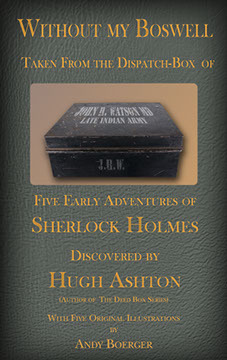
As far as Sherlock is concerned, I want to get up to 56+4. So far I am at 35+2. I think it would be disrespectful to do any more than the Canon.At the time of writing (November 30, 2015), there are two new Sherlock Holmes books coming out very soon (like this year!). One is the Dispatch-box hardcover compilation. Eighteen adventures, two published by Inknbeans for the first time, and one for the first time ever in print. There’s also a collection of six adventures we’re calling 1894. It won’t even have my name on the cover. And a new pastiche for David Marcum’s new anthology (Volume IV).Non-Sherlockian tales. I’m nearly through the first draft of a sequel to The Untime, which goes into an examination of madness among other things. Some Lovecraftian, some Wellsian, and some Verneian elements in this, which exist in The Untime as well.There’s a novel which has remained unfinished for about three years, and it’s alternative history, dealing with Siberia and Mongolia in 1917-1920. The real-life mystery of how the Tsar’s gold got lost somewhere along the Trans-Siberian Railway started this one off. I really must get round to finishing Gold on the Tracks(same hero, Brian Finch-Malloy, a 1920s James Bond, as Beneath Gray Skies and Red Wheels Turning). And then? I don’t know. I’ve left it too late to rival Edgar Wallace in terms of the number of books written and published, but maybe I can catch up with ACD.One thing is for sure – without Inknbeans Press and the constant support of Jo and the other Beans out there, I wouldn’t be writing so much. Thank you. And sincere thanks to all those Holmesians/Sherlockians who’ve been kind enough to say nice things about my pastiches. Without your encouragement, I wouldn’t bother writing.
I'd also like to mention the Sherlock Ferret books. Like you, David, I have taken Sherlock Holmes into children's lives, but I've given him a fur coat and a tail. Watson has become a mouse, accompanying Sherlock Ferret in his adventures, and together with Lestrade, who is a rhinoceros (though he is not a very big one), they work to foil the plans of the nefarious Moriarty Magpie. People who see the paperback editions of these books usually buy them – Andy Boerger's illustrations are delightful, and seeing them online on Amazon doesn't do them justice. They've been written to be read by 7- to 10-year-olds, or read by parents to slightly younger children.
Thank you for your time, Hugh. We all appreciate bit very much
Go to Hugh's website HERE
November 26, 2015
An Evening in Baker Street
And the very good news is that 'Sherlock Holmes and the Lyme Regis Horror' is currently the Number One Bestseller in the Sherlock Holmes Mysteries category on Amazon UK!!
Coming soon, well not all that soon, but definitely coming is An Evening in Baker Street. Three shortish pieces with the longest of them taking the form of a conversation between Holmes and Watson on the eve of Holmes's retirement. Although a few familiar faces drift in and out of the evening...
Oh go on then, have an excerpt:
‘Good evening, Watson.’‘Evening, Holmes.’‘I trust your rounds were not too onerous and your patients not too demanding.’‘No more so than is usual, Holmes. Your note was a little short on information and your prose as always, rather terse. You need my assistance with a knotty problem?’‘If I had a knotty problem as you term it, then I would only be too glad to share it with you, but I have an announcement to make.’‘That sounds rather portentous.’‘You may certainly see it as such. I am retiring, Watson.’‘I have never seen you as retiring, a little diffident maybe!’‘Good old Watson! A dose of your pawky humour is nearly always welcome even if at times I fail to understand it fully. As you may have gathered and chose to ignore, I have decided to retire from this profession of mine.’‘To do what? I cannot imagine the sight of you in carpet slippers, sitting beside the fire in a state of torpor.’‘No more than I can, my friend. I have a worthwhile goal in mind to fill my days; I shall keep bees.’‘Bees?’ ‘Indeed, Watson. Bees.’‘But you know nothing about bees or the keeping of them.’‘Is that so? Pray, have a look at the volumes on the dining-table; there you see Langstroth on the Honey Bee, Root’s essential The ABC of Bee Culture and Playfair’s Of the care and knowledge of bees, their management and natural history, containing an account of the singular mode of generation by which they are produced. What do you think?’‘I think that Playfair should have been advised by his publisher to come up with a rather more enticing title for his tome.’‘Perhaps he did not share your love of penny-dreadfuls! My hives are ordered; Langstroth hives in fact with tried and tested Quinby frames. My colony will soon follow’‘Is Mrs Hudson aware of the changes to her yard?’‘There will be no changes to her yard for I am decamping to Sussex. I have taken a villa at Fulworth on the edge of the southern downs. It fulfils my requisites to the letter; enough land to indulge my new hobby, peace, quiet and seclusion and the glorious country and sea views that you have been known to wax most lyrically about.’‘I remember well your own comments on the countryside, remarking on the impunity with which crimes may be committed there. If I waxed lyrically it was to countermand your own somewhat jaundiced view of the delights of country living. Yet, you were brought up in the country so I never quite understood your antipathy towards it.’‘As to that I cannot profess to have any great antipathy towards it, not in reality. My own childhood, spent in the moors of North Yorkshire, was reasonably happy notwithstanding certain tensions within the family circle. I was much like any other child, you will be surprised to learn. I climbed my fair share of trees, slid down hayricks a plenty, and rambled the fields with a toy bow and arrow imagining myself to be a big game hunter.’‘With Mycroft as companion in these adventures?’‘Nay, Mycroft was neither built for such pursuits or indeed had the inclination. And remember, he is seven years older which would have tended to exclude sibling adventuring. I was a solitary child, which will not be any great surprise to you even if the nature of my pastimes does. My chosen profession coloured the countryside for me, the pastoral scenes I remembered from my childhood were now replaced and tainted by murders, beatings, blackmail, robberies and the like in leafy Surrey, the gardens of Kent or the downs of Sussex. But now as I free myself from the shackles of detecting, I can rediscover the love of the countryside I once had.’‘You speak as though it will a matter of little or no consequence to throw off the mantle of the world’s greatest consulting detective.’‘Really, Watson, I do not believe anyone thinks of me in those terms, they are your words, your prose.’‘Methinks you protest too much, Holmes. You are more than aware of your special gifts in your chosen field.’
‘And I am aware that you chose to exaggerate those gifts to embellish your stories. I am convinced that your readers saw me as a superhuman magician who could do no wrong and was never wrong.’
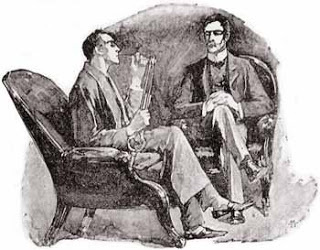
August 21, 2015
New Project.....all suggestions welcome!!

ANY HELP APPRECIATED!!
I have been asked to contribute two Sherlock Holmes stories for inclusion in two anthologies to be published next year. One will be set before Watson arrives on the scene and feature Holmes in his lodgings/consulting room in Montague Street. Thinking it may involve one of those unrecorded cases that Watson teased us with from time to time, such as theTarleton murders. The other story needs to be set during Holmes's great hiatus (1891-1894) when he was presumed dead. As Florence is mentioned by Holmes as one of his first ports of call after his escape from the Reichenbach Falls that may be where I may set my tale.
If anyone has any ideas or suggestions....feel free to shout them in my direction!!
Thanks...

August 13, 2015
'Lizzie Borden took an axe, and gave her mother forty wha...
Holmes and Watson: An American Adventure is released in the UK on the 14th October. For a chance to win a copy, follow the link below. Good luck!!
.goodreadsGiveawayWidget { color: #555; font-family: georgia, serif; font-weight: normal; text-align: left; font-size: 14px;
font-style: normal; background: white; }
.goodreadsGiveawayWidget p { margin: 0 0 .5em !important; padding: 0; }
.goodreadsGiveawayWidgetEnterLink {
display: inline-block;
color: #181818;
background-color: #F6F6EE;
border: 1px solid #9D8A78;
border-radius: 3px;
font-family: "Helvetica Neue", Helvetica, Arial, sans-serif;
font-weight: bold;
text-decoration: none;
outline: none;
font-size: 13px;
padding: 8px 12px;
}
.goodreadsGiveawayWidgetEnterLink:hover {
color: #181818;
background-color: #F7F2ED;
border: 1px solid #AFAFAF;
text-decoration: none;
}
Goodreads Book Giveaway

Holmes and Watson
by David Ruffle
Giveaway ends October 13, 2015.
See the giveaway details
at Goodreads.
Enter Giveaway
April 23, 2015
Holmes and Watson: An American Adventure
Order it here: Amazon UK and is already available on Amazon US
And a look at a work in progress now: Sherlock Holmes and the Scarborough Affair. A tale of strong women, chambermaids, spies, murder and cricket.. It is a collaboration between myself and Gill Stammers. A quick peek:
Miss Poole turned to face me and for the first time during the interview, she showed surprise. I was a little abashed as I realised immediately that I had been somewhat curt, having berated Holmes for his own rudeness earlier. “Ah, you and I have come between Dr Watson and his supper, Miss Poole. A very unwise course of action, of which I have been guilty many a time and should know better. Liberate our food from beneath its cloche, Watson and we will all partake of the meal. Perhaps, then, we can continue our discussion in a less formal manner and Miss Poole may consider us as colleagues rather than foe.” Although I found Holmes’s choice of words unexpected, I wasted no time wondering about them and gave my full attention to removing the covers. I was delighted to see, not only the fare that lay beneath, but also that the food was still warm. I barely registered Miss Poole’s response. “Colleague, Mr Holmes?” I busied myself with creating space for our plates. The chef had prepared a luxurious selection of the finest fish, meats and an array of English vegetables, transformed with Gallic flare, to create a merger of the two culinary cultures. The Beaune had been opened by the sommelier before being despatched to the room to allow it to breathe. I decided it had breathed long enough. “Miss Poole, may I pour you a glass of wine to apologise for my former manner?” “Thank you, I accept your apology, but there is no need to give up your wine. It is a vintage for gentlemen, not housemaids. Besides, I observe there are only two glasses.” I looked at her with some scrutiny to see if she was mocking me. Holmes chuckled. “Even with your experience of women on three continents, Watson, on occasion, you are still able to be silenced by them. I will forgo the wine.” Chastened, I set about dividing the food and despite Miss Poole’s protestations, I poured her a little of the wine to see if indeed it was acceptable to a housemaid. She, at first declined the food, declaring that it may be too rich for her. I persuaded her to take a small amount of fish. “Fish is excellent food for the brain, Miss Poole.” “Thank you Dr Watson, I will be sure to eat as much fish as possible in future. It is fortunate that it is in ready supply in Scarborough. “May I repeat my query, Mr Holmes? You said ‘colleague’.” “Your self-proclaimed attention to detail suggests to me two occupations, neither of which is housemaid. The first, although I have discounted it, is that you are a writer, following in your father’s footsteps.” “That must be it, Holmes! Miss Poole is writing detective fiction. No doubt, we are to be rewritten as characters in her book and the setting is The Grand Hotel,” I exclaimed with excitement as it seemed to fit her actions. “You must have blessed your fortune to be able, not only to observe, but discourse with the great Sherlock Holmes.” “Watson, you have overlooked the fact that I have discounted the theory that she is an author, using the hotel and ourselves for material in a penny-dreadful, for housemaids by a housemaid. I believe Miss Poole, that you consider yourself to be an amateur detective.” “How are you able to arrive at that theory, Holmes?” I said, somewhat disappointed. I had envisaged Miss Poole entreating me for advice, being a published author myself. “The answer is, as always, simple, Watson. Had Miss Poole been immersed in a plot for her own novel, she would have been unable to keep it to herself when she spoke of her father’s work. In my experience, writers are not known for hiding their profession modestly under a bushel. Self-promotion is key to success and ego.” I felt I had been admonished; my character tainted. “Come, come, Watson, grant me a little amusement at your expense. You are aware that I suffer your writings of my exploits with forbearance. “So, Miss Poole, am I correct in my reasoning or is Watson going to spirit you away to discuss villains and nefarious deeds?” “My half-sister, Elizabeth and I are in the process of establishing our own two-woman detective agency,” she announced. I was pleased to observe that she did not pander to Holmes’s vanity by exclaiming his genius at discovering her secret. “I am, as I explained earlier, a housemaid and have been since my arrival in May. My intention was to join my sister in Scarborough at the beginning of the summer to work as a means to an end in supporting myself whilst my sister takes care of the arrangements in setting up our agency.” “What nature of cases do you intend to investigate? Whom do you expect to use your services? It is an unusual occupation for young women and I am intrigued.” “We are ambitious, Dr Watson and hope that our business is not restricted to finding lost cats for wealthy women, although I suspect there may be many of those.” “Do you not see, Watson, a detective agency run by women is a capital idea. Surveillance by a woman would be so unlikely as to go entirely unnoticed. Baskets of shopping, waving parasols, taking tea, gossiping on street corners in various apparel; hiding in plain sight; it is the perfect cover. Sisters going about their daily routine, uncovering crime; who would suspect them?” “That was precisely our conclusion, Mr Holmes and of course, we could keep a look out for lost cats at the same time.” “So, as I have said, we are colleagues, Miss Poole. I assume you stumbled on this case quite by chance.” “I may be working here to make ends meet, but I keep my eyes and ears open at all times. I have watched the events of the last two days unfold and not only do I know that there is a jewel thief in the hotel, but I also know his identity.” Holmes leant forward on his elbows, his eyes shining, “So, Miss Poole, perhaps you would care to enlighten us, although I have my own suspect in mind. Are they one and the same?”
“Perhaps, if you had enlightened us at the beginning of the interview, I could have been enjoying an evening in the ballroom,” I muttered.
February 26, 2015
Holmes and Watson: An American Adventure
February 11, 2015
WHEN SHERLOCK MET LIZZIE
After he had done so he invited us to the holding cells to see Lizzie. Holmes insisted that if were to interview her then he would rather it take place in different, more congenial surroundings. Hogan agreed that it was probably a good idea and invited into an empty office on the second floor, empty save for a desk and two chairs. A short while later Hogan entered the room with Lizzie Borden who cut an abject figure, manacled as she was to an officer. Abject, yes, but strangely proud, almost dignified, at least that’s how I saw her. She was small of stature, but she seemed to dominate the room somehow. Holmes asked if the manacles could be removed. The officer looked at Hogan who nodded his silent assent. I invited Lizzie to sit, which she did hesitantly. I sat in the other chair and Holmes perched on the corner of the desk. “Miss Borden, my name is Sherlock Holmes and this is my colleague Dr Watson. The other gentlemen you know of course, but they are just leaving.” “This is pretty irregular, Mr Holmes, I have to say, this is my case after all.” “Yes, Chief, and it will remain your case I assure you, but if you could indulge me just this once, I would be forever in your debt.” “Very well, Mr Holmes. I will leave you to it, Come on, Smith.” “Now, Miss Borden, can I fetch you anything? A drink maybe?” Lizzie did not speak, but shook her head. “Very well, now, do you know why you have been brought here?” “Yes.” The voice was clear and free of emotion. “What is your connection to Sansom Weinberger?” “I have none. I do not know the man.” “Some five years ago you attempted to purchase prussic acid from his drugstore.” Lizzie did not respond. “Do you deny that was the case?” “I may have done. I can’t remember all my dealings from that time. If I did, what of it?” “The police are suggesting that his murder may be an act of revenge by one who felt they had been wronged.” “I have nothing to say on the matter.” “This is a murder investigation; you would be well advised to keep nothing back.” “I do not know the man. I am sad that he has been murdered, I deplore the act, but I cannot help you further.” “You do not recall attempting to purchase poison from the man?” “No,” she answered with an emphatic shake of the head. “Very well, perhaps you are more familiar with the name, Mrs Honoria Walters?” “I do not recall the name.” “Miss Borden, just a few weeks ago I am given to understand that Mrs Walters caught you in the act of stealing items from the clothing store she manages, perhaps you cannot recall that event either.” “It was a misunderstanding. I am prone to forgetfulness and once I realised the situation I apologised and Mrs Walters, if it was her, accepted my apology.” “My understanding of the matter is that Mrs Walters threatened you with police action. This was in fact overheard by others in the store.” “Then I fear you understand very little. The truth is as I have told it. Why you choose to bring this matter up I do not know.” “The answer to that is simple; Mrs Walters too, has been murdered.” Lizzie’s face remained blank, her features unmoved, registering neither shock or surprise at Holmes’s words. Unblinking, she stared at Holmes. “I am mighty sorry for the poor woman, but I cannot help you, you must search for your murderer elsewhere.” “Elmer Hogan will be asking you to account for your movements during the night, perhaps you can enlighten us?” “I do not see I have the need to do so, but as you obviously feel that you can trample all over my privacy, I can tell you that I was at home all evening, but when I retired I found I could not sleep so I rose and left the house and just walked to clear my head. It’s something I often do, for the good folk of Fall River deny me the freedom to do as I like and go where I like without fingers being pointed in my direction. And yes, I hear the comments and the spite in their voices. Is it any wonder I have taken to parading the streets under cover of darkness?” “Was you sister aware that you had left the house?” “I very much doubt it; she is in Concord visiting friends of the family. If only I had known I would need an alibi I would have asked her to cancel her visit,” she responded with a sweet smile, but devilment in her eyes. “Your sister, Emma has requested my help in ascertaining the truth of what befell your father and mother. Were you aware of that fact?” “She was NOT my mother, she was my step-mother” she spat out. Emma is always wanting to know the truth of what happened that day, she can be rather tiresome on the subject.” “Do you not want to know the truth, Miss Borden or do you know it already?” asked Holmes pointedly. “The dead are dead and buried, leave them be. They cannot be brought back to life even if anybody wished it.” “Would you wish it?” “I have nothing further to say on the matter.” “Very well, although I certainly have a mind to tax your memory of that day at a future date. Do you use perfume, Miss Borden?” “Your questions are most amusing, Mr Holmes. Why in the world would you ask such a thing?” “It may have a bearing on these current crimes.” “As I know nothing of these crimes then I fail to see the relevance of your question, but as the answer is of supreme unimportance then I am willing to give you that answer. No I do not use perfume or any kind of scent.” “You are not aware of a perfume which rejoices in the name of ‘Midnight in Paris’?” “I have never heard of it. Will that be all? For, as you say, Elmer Hogan will want his turn now.” “Thank you for your help, Miss Borden, that will be all for now.” Holmes rapped on the door and Lizzie was escorted back to her cell.
“Well?” inquired the Chief. “What do you think, Mr Holmes?”“She is, I believe, a very strong-willed woman, but if you want to know whether I believe her guilty or not, then you may have to be patient.” “Thank you Mr Holmes, the evidence points to her guilt and that is enough for me to go ahead and charge her.” “Chief Hogan,” I protested, “you have no evidence to speak of unless it’s a crime for Lizzie to have known these two people.” “Not only knew them, Dr Watson, but had run-ins with them. There were bad feelings and look at how the murders were committed, with an axe or hatchet.” “My dear Hogan,” interrupted Holmes, “on that basis we must attribute every such murder in the whole of the United States to Lizzie Borden! No, it will not do. Watson does have a point; there is no evidence as such.” “As to that, this is my case and you must allow me to run it as I see fit and I will apprise Marshal Hilliard of my suspicions and intent.”
***************************************
“Well,” asked Holmes as we walked towards Second Street, “what did you think of the infamous Miss Lizzie Borden? Your impressions may be invaluable to me as is often the case.” “She brought to my mind the image of a cobra, poised and ready to strike. I believe her to be a formidable woman who is capable of anything.” “Upon my word, Watson, she certainly made an impression on you and you her great defender too.” “I am none too sure I should be cast in the role of defender, Holmes, I have merely noted the incongruity of someone acquitted of all charges in a court of law, but declared guilty by so many people. Can anyone really know the truth of what happened that day?” “That remains to be seen, but who knows, two old sleuth-hounds like us may yet find a scent which has remained dormant these last five years.” As we walked past the Borden house, I shivered involuntarily, but I was sure I was not alone in that. For everyone for whom the house held a morbid fascination there were no doubt others who gave it a wide berth.
December 11, 2014
Holmes in Oz
It is a fact that even whilst we are cocooned in this great city of ours, nature can make her presence felt. A gale shrieked and moaned outside on this particular day that I write of. I looked out of the window and was met with the sight of debris being picked up and hurled down Baker Street as though they were children's playthings. The windows rattled in their casement and the gas dimmed and lowered every few seconds. Holmes was busy continuing research he had undertaken into Early English Charters and appeared to be oblivious to the furious display of nature outside. As I crossed the room to pour myself another coffee, the wind shook the very fabric of the building so much, that it felt like we were in motion. Then, inexplicably, there was silence, followed by what seemed like an explosion. Everything inside the sitting-room that was not held down securely, jumped into the air. "Good Heavens Holmes, what on earth was that?" I asked. "I think, perhaps dear fellow, we should investigate and make sure no one outside has come to any harm." The wind had died completely as had the normal street sounds we associated with this busy thoroughfare. We descended the seventeen steps, opened the front door to be met with quite an unbelievable sight. The house was surrounded by a great deal of what I thought were children, but then I recognised them as adults suffering from a form of Dwarfism. They were pointing at us and gesticulating wildly and peering at the very foundation of the house with looks of wonder and amazement. I feel I cannot do justice to what we observed, everything we now saw. The road, houses and indeed these little people were cloaked in the most vibrant hues; reds, oranges, yellows, greens. The surface of the road was a garish yellow and radiated out from a central point. Holmes whispered to me, "Watson, I have a feeling we are not in Baker Street anymore." Before I could answer we were approached by a most beautiful creature, who seemed somehow illuminated from within. She pointed at Holmes. "My name is Glinda. Are you a good wizard or a bad wizard?" she asked of him. Holmes took all this in his stride as though it was the most commonplace of dialogue, "I am not a Wizard of any kind, my name is Sherlock Holmes and this......" "Oh well, is he the Wizard then " she asked, now turning her attention to me. "I assure you, madam, that neither of us is a wizard, why on earth would you think such a thing?" Holmes asked her. "The Munchkins called me and said a new wizard had just dropped a house on the Wicked Witch." "Munchkins," I asked, "who or what are Munchkins?" "Why, these are Munchkins," she answered, indicating the throng of little people surrounding us," and there is the Witch, under your house." "My dear we owe you a thousand apologies, we had no intention of harming anyone." "There is no need of an apology; the Munchkins have declared you both national heroes." One of the little people, the Munchkins as she called them, stepped forward to me, "we'd like to thank you sweetly for doing it so neatly." I stammered a reply and looked to Holmes, "how on earth do we get out of here, Holmes?" "We will possess our souls in patience until we have gathered sufficient data to enable us to make good our return," he replied. A piercing scream filled the air and an ugly looking witch, straight out of a child’s story book descended on a broomstick. There were cries of, " Oh no, the Wicked Witch," all around. I turned to Glinda, "Have we not destroyed the Wicked Witch?" "This is her sister, and she's worse than the other one was." "Who killed my sister? Was it you?" she screamed, fixing her eyes upon me. "I assure you, madam, it was a complete and utter accident." "Well," she said, looking even more threatening, "I can cause accidents too." She walked over to all that was left of her sister, "where are the ruby slippers? Who has them? Give them back to me," she cried, working herself into a veritable frenzy. "There they are," answered Glinda, pointing at me, "and there they will stay." I looked down at my feet to find that instead of my normal footwear, my feet were now adorned with these ruby slippers; not a shade that best suits me it has to be said. The Wicked Witch became hysterical at this point screaming over and over, "Give me back my slippers." Holmes said to me, "Keep tight inside them, Watson, their magic must be very powerful or she would not want them so badly." After issuing yet more threats of dreadful violence against our persons, she mounted her broomstick and was gone. Holmes took me to one side as the Munchkins continued their unrestrained celebrations. "I am of the opinion, Watson that these slippers with the magic that is undoubtedly contained within them may hold the key to our safe return to dear old Baker Street." He stretched himself out on the ground and examined them for several minutes. Glinda looked on, bemused, "Mr. Holmes, what are you looking for?" "I am hopeful of using the magic powers of these slippers to return my friend and me back to our own life." "Your friend has that power already." "I do?" "Those magic ruby slippers will take you home in two seconds. Now then, close your eyes and tap your heels together three times. Look at your friend and think to yourself, 'There's no place like home. There's no place like home.' "There's no place like home, Holmes. There's no place like home, Holmes. There's no place like home, Holmes." I awoke to find Holmes standing over me, with a smile on his face. "My dear Watson, you are especially garrulous in your sleep today and surely only you could sleep with such a storm raging outside." I stretched my limbs, got to my feet somewhat shakily and glanced out into the street. I was relieved to see normality, no Munchkins, no witches, just a resolutely ordinary Baker Street. Odd how the mind can play tricks on you like that whilst asleep. "Watson?" "Yes, Holmes?" "Whatever have you got on your feet?"

